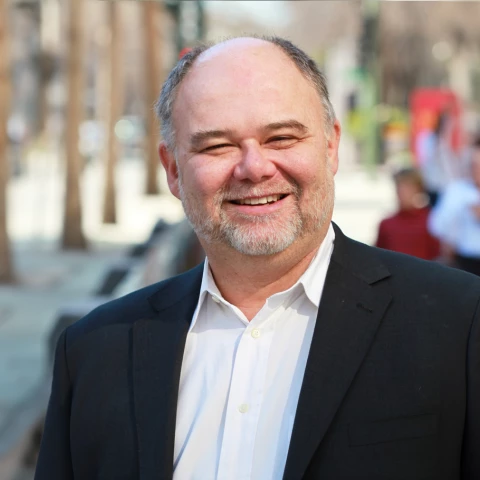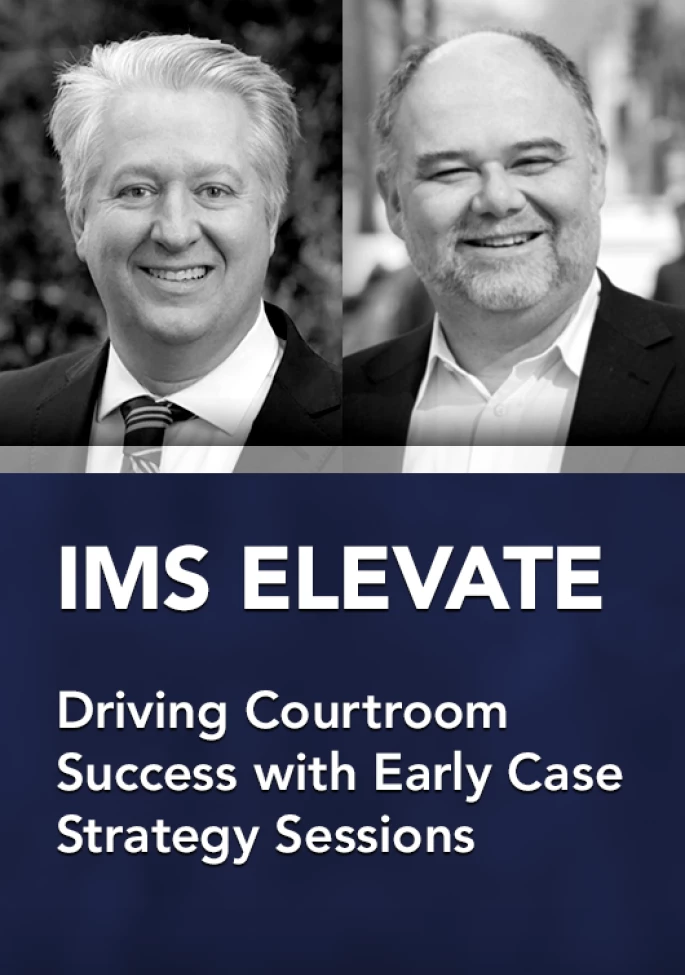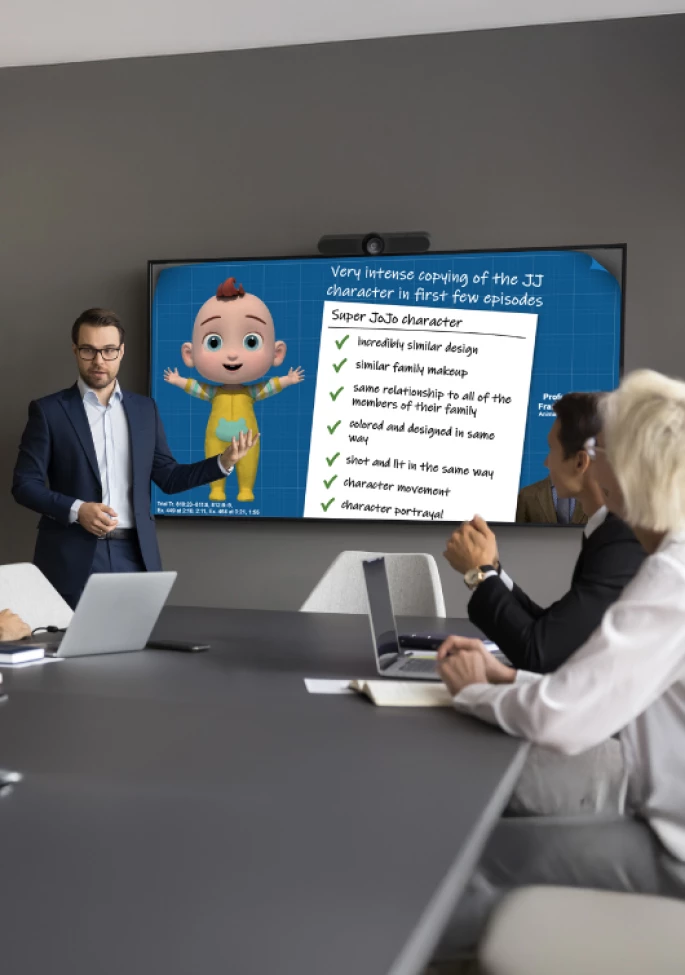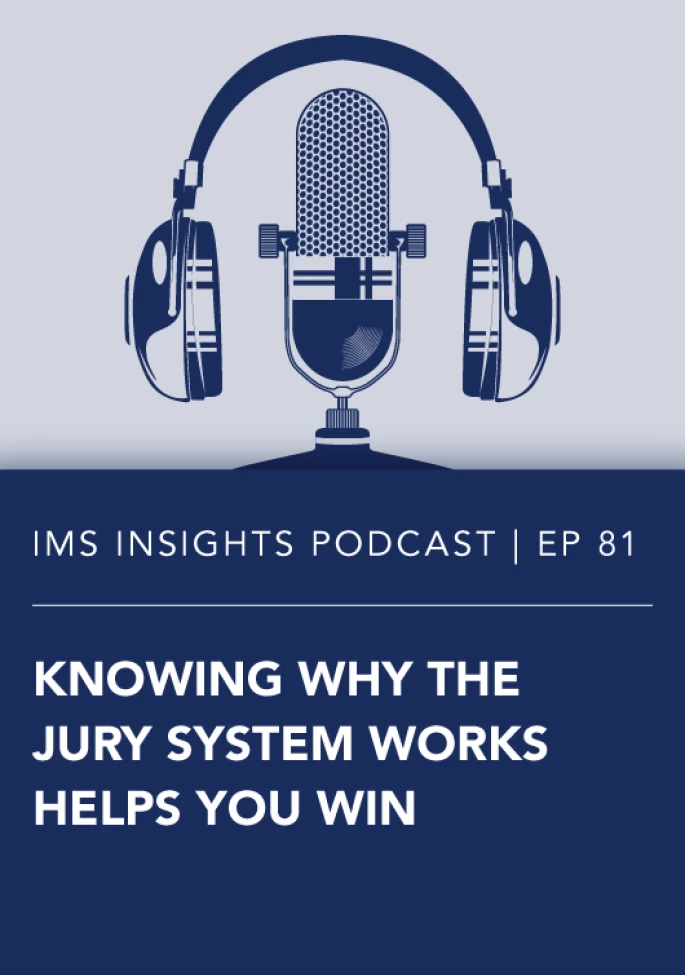Marie-Petra Adams: Welcome, everyone, and thank you for joining us. I'm Marie Petra Adams, Vice President of Client Success here at IMS. Today, we're diving into one of the most critical but often overlooked parts of litigation, early case strategy. Our guest is Chris Ritter, a pioneer in the litigation field, whose philosophy and methodology have influenced how countless trial teams prepare. Chris will share why an integrated trial strategy, one that brings together the right team, a unified theme, and a refined message, creates a stronger, more focused case. Leading our discussion today is Adam Bloomberg, our Senior Client Success Advisor here at IMS. Adam, handing it over to you.
Adam Bloomberg: Thanks a lot. Chris, welcome back.
Chris Ritter: Thank you very much.
Adam Bloomberg: Your philosophy and methodology for case strategy is well known in our field, and you are, as you know I'm sure, a pioneer in our field. I'd like to know, what's your approach to case strategy?
Chris Ritter: As long as pioneer doesn't mean old guy. Well, I think first of all, I believe in what I call an integrated trial strategy. And it's integrated in the sense of integrating a team, integrating a message, and taking that message, which is going to be the general theme, the theory, how you try the case, who you want to be trying it to, developing that as early on. It takes effort early on, but at the same time, I think it ends up with a much stronger case. Now I know you're going to ask me what if you wait till the end? Yes, it can be done at the end as well, but it's an iterative process. So to the extent that you have time to do it and do it over and over again and refine it each time, the better it gets.
Adam Bloomberg: All right, so let's, let's start with, what are the components of your approach to case strategy?
Chris Ritter: Yeah, I'm, I'm going to lay them out to you in a linear manner. But as I said to you, it's a creative process. Creative processes never proceed linearly. There's always a back and forth, and it's spinning around. The first thing on this list is something I call engaging in Mental Mining. And you and I have spent, that's a whole program in and of itself. But it's the process of basically recognizing that, as we learn, what we do is we put into buckets in our subconscious ways of organizing and understanding facts. And we need to uncover those, because if we're going to teach, we have to be able to have toeholds, things that allow people to begin to understand. They're hearing stuff for the first time. They're hearing new stuff. They're hearing stuff topically, which may be complex. And we organize things in a way that we have tools that will allow us to understand.
And by going in and figuring out what those are, that's Mental Mining.
You also have to understand the Theory of Core Values. This is something I've developed over a long number of years, that, I truly believe that there are about 12 different core values that motivate people. And these include, I won't go through the whole list, I'm not sure I could, I would probably forget a few. But compassion and fairness and empathy and common sense and science and check-listing, sometimes even vengeance and compassion and mercy, these are the things that motivate people. And you have to understand which of them are going to apply in which case. Not everyone applies in every single case, not every case, but every case has at least some of them, and there's a process of figuring out what those are.
Then there's effectively using what I call, kind of, intelligence, using evidence, and using imagination to come up with the unified case theory. What's this case really about? Which allows you to then figure out what the story is and then the plot. How do we go about telling it? And this is a process that is very much kind of a whittling down, a narrowing down from what the potential facts are to ultimately the best way to tell the story.
You also have to understand active jurors, you know, active jurors, again, something that could go on, we could go on for hours about. These are the people who've made the transition from being neutral finders of fact to being advocates for one side or the other. These are the people who have great power in forming the coalition that's necessary. You have to then go to the next step, which is to figure out how to arm them, how to give them the persuasion tools that they need so that they understand you, that they adopt what you're saying. And then most importantly, the way that they can then, during jury deliberation, persuade others to come join them.
And then finally, there's the process of testing it and modifying it, making sure that you've got all the questions answered, making sure that you've got it the most effective way. So I've given it to you linearly, but it, it tends to be kind of a spinning process, as every creative process tends to be.
Adam Bloomberg: OK, so I, I hear you saying jury, jurors a lot in that. Let's back up two years, when the typical case starts. What are your sessions? What does that strategy session look like early in discovery
Chris Ritter: Well, first of all, I think you correctly pointed out, I said jurors, jurors, jurors. And I want to rest everyone to understand what I'm describing applies to any adversarial proceeding, right? What I'm describing applies to not only jury trials, it, it applies to bench trials, it applies to arbitrations, it applies to regulatory discussions. You know, it basically could be any kind of a dispute. So it's not just jurors. I'm saying jurors because that's where I spend most of my time. But what does it look like in doing this?
Well, ideally, you have the time. But as I said, if you don't, just doing some of these things, even just before trial, is extremely helpful. And I've had lots of cases where that's where we start, right? Because people are coming to you somewhat in a panic because the things hadn't, haven't settled, and they're facing an imminent trial. Ideally, you start early on. And I think a lot of lawyers think that we don't know enough in order to get started. You know, we haven't done the discovery.
Well, ironically, I think you know a lot about the case before you even get started. And you can start this process, hopefully, before you start discovery. In fact, I've got a lot of institutional clients who appreciate the fact of doing it early because it helps focus discovery. Instead of being shotgun, you're much more focused. And ideally, you do this for, you know, a day, and you really focus on what's going to matter. You have a really good idea of where you're going, and you can focus yourself and be more, hopefully less costly, and more focused on the case prep itself.
If you have the time and the resources. I would again do it about 60 days before discovery ends because there's never been a case yet where I haven't, when we sat down 60 days before discovery, somebody realizing that, oh my god, we never thought of that. We need to go out and do the discovery. So it still gives you enough time. And if a case doesn't settle, you know, it would be great to do it as part of a Metal Mining, Metal Mining as part of a mock trial or something, you know, 30 days before trial.
Adam Bloomberg: OK, that's sometimes “pie in the sky” thinking though.
Chris Ritter: Yeah, no, I agree.
Adam Bloomberg: Our clients have 10-15 cases going on at once. What happens when, for whatever, a number of reasons, for whatever reason, they think, oh, this isn't going to go, and all of a sudden they, they've got to go to trial, and let's say they're six to eight weeks out now. What does your case strategy session look like?
Chris Ritter: I think it looks very much like the same thing. There's really focusing on the Mental Mining about what's, what's important. But then I think there's also going to be a focus on, who are our active jurors going to be, what are the core values that they're likely to have? And you can tell that by learning the story, by getting people to tell the story. And then how do we get the tools that we need to be able to do that?
Adam Bloomberg: Yeah. So I assume in this scenario, case themes have been figured out a long time ago. What are the specific types of things you're doing when we're six weeks out from trial in, in a typical Mental Mining?
Chris Ritter: Well, if we're six weeks out for trial and this is the first time that we're, that we're doing it, you'd be surprised at how many of the case themes can be further refined, right, by somebody. Mental Mining is usually led by somebody that I call the active or critical listener, who's there to challenge the people as to why something is really important. It's not that they're, the person's any better, but we're not in the weeds, right?
These guys have been in the weeds for all these, all these years getting ready. So we have a little bit of distance that allows us to give it a little bit of a different, different perspective. But, so there'll be inevitably some refining of what that theme is going to be. But there will also then be some triaging of, what are the arguments that are going to be most effective, and how do we make them? What tools do we need to make them, whether they be graphics, whether they be modifying the story, whether they be taking the expert and putting the expert testimony together in a slightly different manner. There really is a lot of fine-tuning that can be done, even up to the last minute.
Adam Bloomberg: Can trial teams do this on their own?
Chris Ritter: You know, I think they can do it on their own. I think it helps if you, for example, come to a lecture, learn about it, get the, understand the general principles. I don't mean to be plugging my own work, but you know, just spend some time looking at the stuff that I've developed. But I think it's more effective when you bring somebody in from the outside, this critical or active listener that I'm talking to you about. Part of their job is to challenge. Part of their job with, hopefully not being obnoxious, but to really say I don't get it. You know, I don't see why that's important.
We've all been in cases where we've gotten into the weeds and we think something is really, really classically important, and then somebody comes in with a fresh view. It's what the Zen calls the beginner's mind, you know, in the beginner's mind, all things are possible. And they are, though. It's that different perspective that allows you to have a real critical evaluation. Sometimes things change. Sometimes things don't change. But I think it's valuable to have somebody who isn't wedded to and part of the group that has, you know, felt the institutional need to develop the story.
Adam Bloomberg: Well, I appreciate your time, as always.
Chris Ritter: Well, thank you. It's always good to see you. I hope you're well.
Adam Bloomberg: Thank you.
Chris Ritter: All right. Thank you.
Adam Bloomberg: Yeah.
Adam Bloomberg (Outro): Thank you to our guest for speaking with us today. To discover how the IMS team can help give your case an edge, check out imslegal.com or shoot us an email at contactus@imslegal.com.
IMS has served trusted law firms and corporations worldwide for more than 30 years and over 65,000 cases. As a strategic partner for the full case life cycle, our integrated teams provide specialized advisory support, expert witness services, litigation consulting, visual advocacy, and presentation technology to elevate strategies and protect hard-earned reputations. Learn more at imslegal.com.








